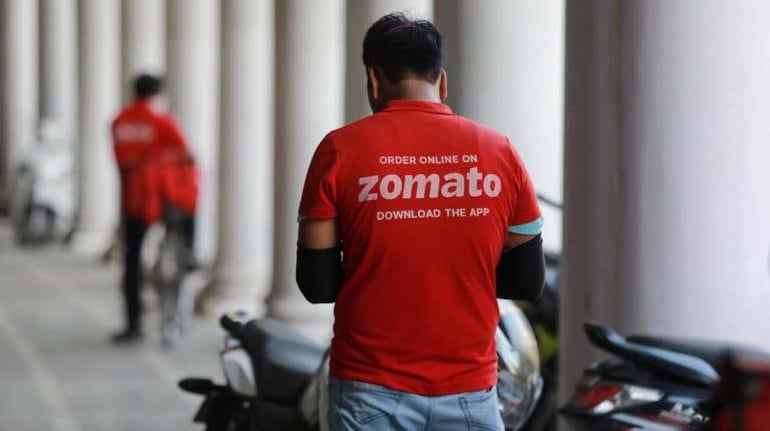



India’s two biggest food-delivery startups Swiggy and Zomato are cleaning up their act, hitching a ride on electric vehicles as companies across the world face the heat over carbon emissions and climate change.
The two rivals plan to switch at least 10 percent of their delivery fleets, mostly two-wheelers, to electric in 2021 and are in talks with electric scooter and bike aggregators like Zypp, Spinny and eBikeGo, source have told Moneycontrol.
"While the earlier plan was to hit this target by March, COVID has disrupted the plan and it should happen towards the second half of 2021," one of the sources said.
The move comes amid the government's push for electric vehicles (EVs), growth of support infrastructure and the expected cost benefits in the long run.
Two-wheelers account for 70 percent of the 253 million vehicles on India’s roads, according to JMK Research, a consulting firm with a focus on renewable energy and EVs. There is no data on how many of these are used for commercial purposes but it is known that two-wheelers account for more than 20 percent of the total carbon dioxide emissions in urban areas.
Also read: Electric vehicles a huge opportunity for India: Amitabh Kant
The company was "driving adoption of electric vehicles among its delivery partners by engaging with well-known players who provide B2C mobility solutions", a Swiggy spokesperson said, without sharing any details.
Zomato did not respond to Moneycontrol’s queries.
To curb growing pollution, the government’s think tank NITI Aayog has said that after 2025, two-wheelers with engine capacity of below 150 cc will only be electric. It has also set a target of 30 percent of all vehicles to be electric by 2023.
Food delivery companies are preparing to meet these norms.
Also read: India plans $4.6 billion in incentives for battery makers in electric vehicle push
Saving environment and money
Electric vehicles are not just better for the environment but they will also save money for delivery executives.
"Delivery partners could potentially save an average of Rs 5 to Rs 8 per order and reduce 102 kg of CO2 emission per year per bike by switching to electric vehicles,” the Swiggy spokesperson said.
A delivery person in a metro is paid between Rs 18,000 and Rs 20,000 a month, of which around Rs 5,000 is spent on fuel, maintenance and EMI. Electric vehicles will cut down maintenance costs, with EMI remaining as the biggest expense.
"Typically, a rider spends just Rs 2,000 broadly on EMI and is able to take the rest of the money home," Zypp Electric co-founder and Chief Executive Officer Akash Gupta said.
Zypp is a hyperlocal and last-mile delivery service provider that uses only electric vehicles. It works with Swiggy, Zomato and several other companies.
Electric vehicle riders can travel 80-100 kilometers on a full charge and can then swap batteries at designated stations.
Zypp, for instance, claims to have around 50 such stations in Delhi. Each station has 10 batteries at any given time, it says.
In the financial year 2020, 152,000 electric two-wheelers were sold in the country. This number is expected to grow significantly by 2024, when the battery prices fall below $100 per kwh, according to a study conducted by research and analysis firm JMK Research. The number is expected to grow to 34.5 lakh vehicles by FY 2025.
While the government is pushing for a change, bottlenecks remain. Banks and non-banking financial companies (NBFCs) were still hesitant to offer loans for the bulk purchase of electric vehicles, Gupta said.
"Even as venture capital firms are investing in this sector, they will not be willing to pump in money in an asset-heavy company, which is spending the money on procuring vehicles. We really need banks and NBFCs to look at this segment for financial assistance," Gupta said.
Zypp gets its vehicles funded by high net individuals to whom it pays a monthly rental but the model can’t be replicated at a bigger scale.
Companies like Amazon are reportedly looking to acquire stakes in domestic electric vehicle manufacturers such as Mahindra Electric and Kinetic Green to procure customised electric vehicles through their logistic partners.
The e-commerce giant has pledged to be carbon neutral by 2040. During his visit to India early this year, Amazon CEO Jeff Bezos showcased a fleet of electric delivery rickshaws.

Discover the latest Business News, Sensex, and Nifty updates. Obtain Personal Finance insights, tax queries, and expert opinions on Moneycontrol or download the Moneycontrol App to stay updated!
Find the best of Al News in one place, specially curated for you every weekend.
Stay on top of the latest tech trends and biggest startup news.